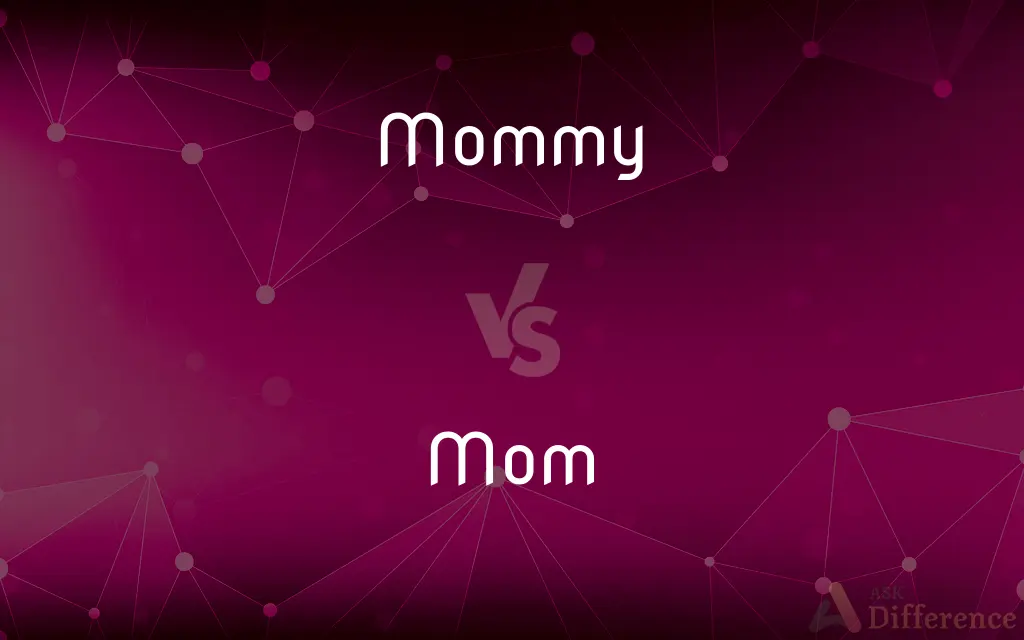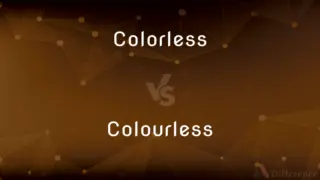Mommy vs. Mom — What's the Difference?
Edited by Tayyaba Rehman — By Maham Liaqat — Updated on March 26, 2024
"Mommy" is an affectionate and informal term often used by young children, while "Mom" is a more universally used term that can be applied in both formal and informal contexts.

Difference Between Mommy and Mom
Table of Contents
ADVERTISEMENT
Key Differences
While "Mommy" might be more commonly heard in private, familial settings where the tone is intimate and personal, "Mom" can be used in both private and public contexts. The use of "Mom" does not diminish the affection felt for one's mother but rather adapts to a broader range of social situations. Whereas "Mommy" might feel too childlike or overly intimate in certain scenarios, especially as children grow older.
The choice between "Mommy" and "Mom" can also reflect the evolving relationship between a child and their mother. As children grow into teenagers and elders, the transition from "Mommy" to "Mom" can symbolize a shift towards a more mature and slightly more independent relationship. However, it's not uncommon for elders to revert to "Mommy" in moments of nostalgia, affection, or need for comfort, underscoring the enduring emotional significance of the term.
Culturally, the preference and perception of these terms can vary. In some cultures, equivalent terms to "Mommy" are used well into grown age, while in others, the transition to a term akin to "Mom" occurs relatively early in childhood. This cultural dimension highlights the diverse ways in which familial relationships and affections are expressed across different societies.
Despite the differences, both "Mommy" and "Mom" are terms of endearment and respect. They embody the love, care, and importance of the maternal figure in an individual's life. Whether one uses "Mommy," "Mom," or another variant, the fundamental bond and affection these terms represent remain constant.
Comparison Chart
Usage Context
Typically used by young children
Used by people of all ages
ADVERTISEMENT
Tone
Affectionate, intimate
Affectionate, versatile
Social Context
More common in private, familial settings
Used in both private and public settings
Relationship Phase
Indicates a younger or more childlike phase of the parent-child relationship
Used throughout the parent-child relationship, adaptable as the child grows
Cultural Variation
Usage and perception can vary widely across cultures
Universally recognized, though cultural preferences for when to use it may vary
Compare with Definitions
Mommy
An affectionate term for mother, used mainly by young children.
The toddler called out for mommy in the middle of the night.
Mom
A universally recognized term for mother.
She thanked her mom for all the support over the years.
Mommy
Reflects a nurturing relationship.
Mommy always knows how to make me feel better.
Mom
Used in both formal and informal contexts.
On the form, he listed his mom as the emergency contact.
Mommy
Conveys warmth and closeness.
I love you, mommy, the child said, hugging her tightly.
Mom
Adapts to the changing parent-child relationship.
As teenagers, they still relied on their mom for guidance.
Mommy
Often associated with early childhood.
His first word was mommy.
Mom
Embodies respect and affection.
His mom was his hero for her strength and kindness.
Mommy
A mother.
Mom
Applicable in diverse social situations.
She introduced her mom to her colleagues at the event.
Mommy
Mother.
Mom
One's mother
My mom gave us each a slice of pizza
I'm waiting for Richard and Mom to get home
Mommy
To treat someone like a mother would; to mother someone.
Mom
Mother.
Mommy
Characteristic of a mother; motherly.
She is the mommiest of mommies.
Mom
Mother.
Mommy
Informal terms for a mother
Mom
To care for in a motherly way.
Mom
Informal terms for a mother
Common Curiosities
How do cultural differences affect the use of "Mommy" and "Mom"?
Cultural norms influence the age at which individuals transition from "Mommy" to "Mom" and the contexts in which these terms are used.
Can "Mom" be used in formal situations?
Yes, "Mom" is suitable for both formal and informal contexts.
Is it common to switch between "Mommy" and "Mom"?
Yes, some people switch between the two based on context, mood, or whom they are speaking with.
Does using "Mom" instead of "Mommy" imply less affection?
No, the level of affection is not diminished by using "Mom"; the choice of term often relates to context and social norms.
Do these terms have equivalents in other languages?
Yes, most languages have equivalents to "Mommy" and "Mom," often with similar nuances in usage and affection.
How does the parent-child relationship influence the use of these terms?
The evolution of the parent-child relationship can influence the transition from "Mommy" to "Mom," reflecting growing independence and maturity.
Does the transition from "Mommy" to "Mom" happen at a specific age?
There is no specific age; the transition varies among individuals and is influenced by personal and cultural factors.
Can the use of "Mommy" or "Mom" affect perceptions of maturity?
Sometimes, the use of "Mommy" may be perceived as less mature, but this largely depends on social and cultural contexts.
Can the choice of term reflect the speaker's age?
Often, yes, with "Mommy" more common among younger speakers and "Mom" used by speakers of all ages.
How do new parents decide which term their child should use?
It often naturally evolves from the child's language development and the terms used by those around them.
Do men and women differ in their use of "Mommy" and "Mom"?
Usage patterns are generally similar across genders, though personal and family dynamics can influence individual preferences.
Share Your Discovery

Previous Comparison
Plastic vs. Fibre
Next Comparison
Colorless vs. ColourlessAuthor Spotlight
Written by
Maham LiaqatEdited by
Tayyaba RehmanTayyaba Rehman is a distinguished writer, currently serving as a primary contributor to askdifference.com. As a researcher in semantics and etymology, Tayyaba's passion for the complexity of languages and their distinctions has found a perfect home on the platform. Tayyaba delves into the intricacies of language, distinguishing between commonly confused words and phrases, thereby providing clarity for readers worldwide.
















































